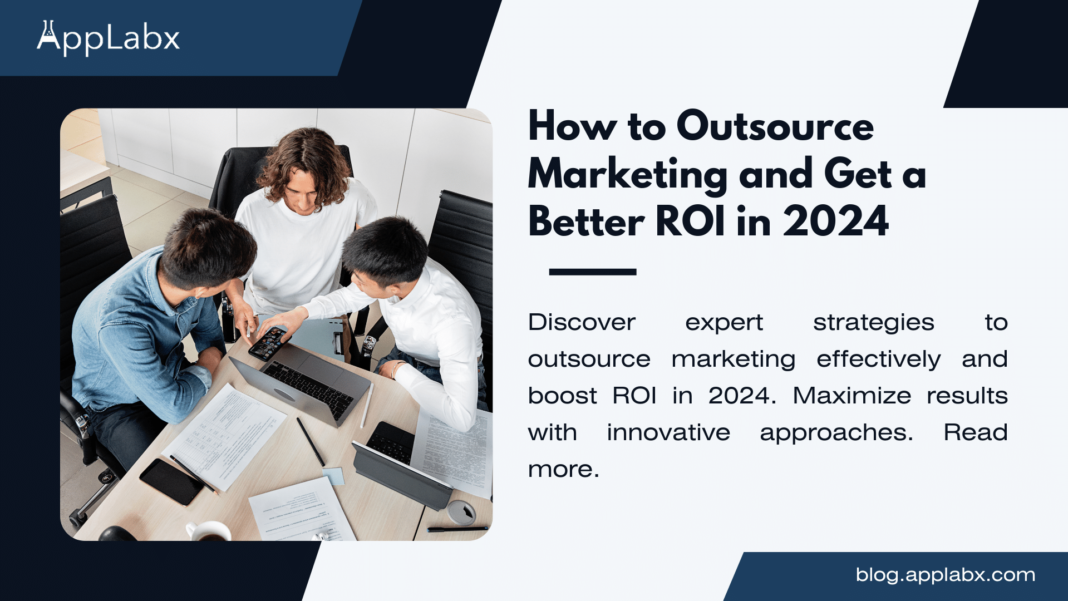Key Takeaways
- Leverage External Expertise: Outsourcing marketing tasks allows access to specialized skills and industry knowledge, boosting efficiency and effectiveness.
- Prioritize Communication and Collaboration: Clear communication and collaboration channels between internal teams and outsourcing partners are crucial for aligning goals and maximizing ROI.
- Stay Ahead of Future Trends: Anticipate future trends in marketing, such as AI, personalization, and ethical practices, to adapt strategies and maintain competitiveness in 2024 and beyond.
In today’s hyper-competitive business landscape, achieving a stellar Return on Investment (ROI) is the holy grail for marketers and business owners alike.
As we navigate the ever-evolving digital realm of 2024, the path to success is increasingly paved with innovative strategies, data-driven insights, and dynamic approaches to marketing.
Amidst this backdrop, outsourcing marketing has emerged as a game-changing solution for companies seeking to amplify their ROI while navigating the complexities of modern marketing.
Welcome to our in-depth exploration of “How to Outsource Marketing and Get a Better ROI in 2024.”
In this comprehensive guide, we’ll delve into the intricacies of outsourcing marketing activities, unraveling the key strategies, considerations, and best practices that will empower you to harness the full potential of outsourced marketing partnerships.

As businesses strive to stay ahead of the curve in a digital-first era, the traditional paradigms of marketing have undergone a seismic shift.
Consumer behaviors are evolving at a rapid pace, fueled by advancements in technology, changes in socio-economic landscapes, and shifting market dynamics.
In this dynamic environment, the ability to adapt, innovate, and optimize marketing strategies is paramount to success.
So, why outsource marketing in 2024?
The answer lies in the unparalleled advantages it offers.
By partnering with external experts and agencies, businesses can tap into a wealth of specialized skills, knowledge, and resources that may not be readily available in-house.
Whether it’s harnessing the power of data analytics, mastering the intricacies of social media advertising, or crafting compelling content that resonates with your target audience, outsourcing enables you to access top-tier talent without the overhead costs and logistical complexities of building and managing an in-house team.
But outsourcing marketing isn’t just about cost-effectiveness—it’s about strategic empowerment.
It’s about leveraging the collective expertise of seasoned professionals who live and breathe marketing day in and day out.
It’s about gaining a competitive edge by tapping into cutting-edge technologies, innovative methodologies, and industry best practices.
And perhaps most importantly, it’s about freeing up your internal resources to focus on what truly matters: driving business growth, fostering innovation, and delivering exceptional value to your customers.
In the pages that follow, we’ll take a deep dive into the world of outsourcing marketing, guiding you through every step of the process—from understanding the current marketing landscape to choosing the right outsourcing partner, implementing an effective strategy, and maximizing ROI.
Along the way, we’ll share real-world case studies, practical insights, and actionable tips gleaned from years of experience working with businesses of all sizes and industries.
Whether you’re a startup looking to scale your marketing efforts, a mid-sized company seeking to optimize your marketing ROI, or an enterprise aiming to stay ahead of the curve, this guide is your roadmap to success.
So, buckle up and get ready to embark on a journey of discovery, empowerment, and transformation.
Together, let’s unlock the full potential of outsourcing marketing and chart a course towards unparalleled growth and prosperity in 2024 and beyond.
Before we venture further, we like to share who we are and our digital experiences.
About AppLabx
From developing a solid marketing plan to creating compelling content, optimizing for search engines, leveraging social media, and utilizing paid advertising, AppLabx offers a comprehensive suite of digital marketing services designed to drive growth and profitability for your business.
AppLabx is well known for helping companies and startups use SEO to drive traffic to their websites and web apps.
At AppLabx, we understand that no two businesses are alike. That’s why we take a personalized approach to every project, working closely with our clients to understand their unique needs and goals, and developing customized strategies to help them achieve success.
If you need a digital consultation, then send in an inquiry here.
How to Outsource Marketing and Get a Better ROI in 2024
- Understanding the Current Marketing Landscape
- Why Outsource Marketing?
- Key Considerations Before Outsourcing Marketing
- Choosing the Right Outsourcing Partner
- Implementing an Effective Outsourcing Strategy
- Maximizing ROI through Outsourced Marketing
- Overcoming Challenges and Pitfalls
- Future Trends and Considerations
1. Understanding the Current Marketing Landscape
In the dynamic realm of marketing, staying abreast of the latest trends, technologies, and consumer behaviors is essential for success.
As we navigate the intricacies of the marketing landscape in 2024, several key factors are shaping the way businesses connect with their audiences, drive engagement, and achieve their objectives.

Digital Dominance in Marketing Strategies
- Shift Towards Digital Channels: The proliferation of digital platforms and channels continues to redefine marketing strategies, with businesses increasingly allocating budgets towards online advertising, social media marketing, and content creation.
- Mobile-First Approach: With mobile devices becoming ubiquitous, marketers are prioritizing mobile-friendly strategies to reach consumers on-the-go, optimize user experience, and capitalize on the rise of mobile commerce.
- Video Content Surge: Video content remains king, with platforms like YouTube, TikTok, and Instagram driving engagement and influencing purchasing decisions. Brands are investing in video marketing to captivate audiences, tell compelling stories, and enhance brand visibility.
Rise of Personalization and Customer Experience
- Hyper-Personalization: As consumers demand more personalized experiences, marketers are leveraging data analytics, AI, and machine learning to deliver targeted content, tailored recommendations, and customized offers.
- Customer-Centric Approach: Brands are placing a greater emphasis on customer experience, focusing on building meaningful relationships, fostering loyalty, and delivering seamless interactions across multiple touchpoints.
- Voice Search Optimization: With the proliferation of voice-activated devices like smart speakers and virtual assistants, optimizing content for voice search is becoming increasingly important. Marketers are adapting their strategies to align with voice search queries and conversational language.
Data-Driven Decision Making
- Power of Data Analytics: Data has emerged as a cornerstone of modern marketing, empowering businesses to gain valuable insights into consumer behavior, track campaign performance, and make informed decisions.
- Predictive Analytics: Marketers are harnessing the power of predictive analytics to forecast trends, identify potential opportunities, and anticipate consumer needs, enabling proactive rather than reactive marketing strategies.
- Privacy Concerns and Regulations: Heightened concerns around data privacy and regulatory compliance are prompting marketers to adopt transparent data practices, implement robust security measures, and prioritize ethical data usage.
Emergence of New Technologies
- AI and Automation: Artificial intelligence and automation are revolutionizing marketing processes, enabling hyper-targeted advertising, personalized messaging, and efficient campaign management.
- Augmented Reality (AR) and Virtual Reality (VR): AR and VR technologies are reshaping the way brands engage with consumers, offering immersive experiences, interactive product demonstrations, and virtual shopping environments.
- Blockchain in Marketing: Blockchain technology is gaining traction in marketing, offering benefits such as enhanced security, transparency in digital advertising, and decentralized data management.
Social Media Evolution
- Social Commerce: The integration of e-commerce features into social media platforms is blurring the lines between discovery and purchase, with platforms like Instagram, Facebook, and Pinterest offering shoppable posts, live shopping experiences, and in-app checkout options.
- Influencer Marketing Maturation: Influencer marketing continues to evolve, with brands focusing on authenticity, relevance, and long-term partnerships to drive engagement and credibility.
- Community Building: Brands are investing in community-building efforts on social media, fostering brand advocacy, generating user-generated content, and nurturing relationships with loyal customers and brand ambassadors.
Examples:
- Nike’s Adaptive Digital Strategy: Nike has embraced digital channels and personalization to connect with consumers on a deeper level. Through its NikePlus loyalty program, the brand offers personalized product recommendations, exclusive content, and interactive experiences tailored to individual preferences.
- Netflix’s Data-Driven Content Recommendations: Netflix leverages sophisticated algorithms and data analytics to recommend personalized content to its subscribers. By analyzing viewing habits, user ratings, and demographic information, Netflix delivers highly relevant recommendations that keep users engaged and satisfied.
- Sephora’s AR-Powered Virtual Try-On: Sephora utilizes augmented reality technology to enable virtual try-on experiences for beauty products. Through its Virtual Artist feature, customers can virtually try on makeup products, experiment with different looks, and make informed purchase decisions without visiting a physical store.

In summary, understanding the current marketing landscape is imperative for businesses looking to navigate the complexities of modern marketing and stay ahead of the curve.
By embracing digital innovation, prioritizing customer experience, leveraging data-driven insights, and embracing emerging technologies, businesses can position themselves for success in 2024 and beyond.
2. Why Outsource Marketing?
Outsourcing marketing activities has emerged as a strategic imperative for businesses seeking to optimize their resources, leverage specialized expertise, and achieve better return on investment (ROI).
In today’s competitive landscape, outsourcing offers a myriad of advantages that can propel businesses towards their marketing goals and drive sustainable growth.
Access to Specialized Expertise and Skills
- Diverse Skill Sets: Outsourcing marketing allows businesses to tap into a diverse pool of talent with specialized skills in various aspects of marketing, including SEO, PPC advertising, content creation, graphic design, and social media management.
- Industry Expertise: Marketing agencies often possess deep industry knowledge and insights, enabling them to develop tailored strategies that resonate with target audiences and drive results specific to the business’s niche or vertical.
- Stay Updated with Trends: Outsourcing partners are dedicated to staying abreast of the latest trends, technologies, and best practices in marketing, ensuring that businesses benefit from cutting-edge strategies and tactics.
Cost-Effectiveness Compared to In-House Teams
- Reduced Overhead Costs: Outsourcing marketing eliminates the need for hiring and maintaining an in-house marketing team, resulting in significant cost savings related to salaries, benefits, office space, and equipment.
- Flexible Pricing Models: Many outsourcing agencies offer flexible pricing models, allowing businesses to scale their marketing efforts up or down based on their budgetary constraints and business objectives.
- Avoidance of Recruitment Costs: Recruiting and training in-house marketing talent can be time-consuming and costly. By outsourcing, businesses can bypass these expenses and allocate resources more efficiently.
Ability to Focus on Core Business Functions
- Strategic Focus: Outsourcing marketing allows businesses to redirect their focus and resources towards core business functions, such as product development, customer service, and strategic planning.
- Increased Efficiency: By entrusting marketing tasks to external experts, businesses can streamline operations, improve productivity, and achieve greater efficiency in their day-to-day activities.
- Scalability: Outsourcing offers scalability, enabling businesses to adapt quickly to changing market conditions, scale marketing efforts as needed, and seize new opportunities for growth without being constrained by internal limitations.
Examples:
- HubSpot’s Content Marketing Success: HubSpot, a leading provider of inbound marketing and sales software, has achieved remarkable success by outsourcing content creation to a network of freelance writers and agencies. By leveraging external expertise, HubSpot produces high-quality content consistently, driving traffic, leads, and customer engagement.
- Coca-Cola’s Outsourced Digital Marketing Campaigns: Coca-Cola has outsourced several digital marketing campaigns to agencies with specialized expertise in areas such as social media advertising, influencer marketing, and digital content creation. By partnering with external agencies, Coca-Cola has been able to execute innovative campaigns that resonate with diverse audiences and drive brand awareness and sales.
- Startups Leveraging Outsourced Growth Hacking: Many startups leverage outsourced growth hacking services to accelerate their growth and reach their target audience more effectively. By outsourcing tasks such as SEO optimization, email marketing, and viral content creation, startups can achieve rapid growth without the need for a large in-house marketing team.

In conclusion, outsourcing marketing offers businesses a strategic advantage by providing access to specialized expertise, cost-effective solutions, and the ability to focus on core business functions.
By leveraging the benefits of outsourcing, businesses can enhance their marketing efforts, drive ROI, and achieve sustainable growth in today’s competitive landscape.
3. Key Considerations Before Outsourcing Marketing
Before diving into outsourcing your marketing activities, it’s essential to carefully evaluate various factors to ensure a successful partnership.
From identifying your specific needs to vetting potential outsourcing partners, these key considerations will help you make informed decisions and maximize the benefits of outsourcing.
Identifying Specific Marketing Needs and Goals
- Define Objectives: Clearly outline your marketing objectives, whether it’s increasing brand awareness, generating leads, driving sales, or improving customer engagement.
- Assess Current Capabilities: Evaluate your internal marketing capabilities and identify areas where external expertise is needed to fill gaps and complement existing strengths.
- Understand Target Audience: Gain a deep understanding of your target audience’s preferences, behaviors, and pain points to ensure that outsourced marketing efforts resonate with your audience effectively.
Evaluating the Expertise and Reputation of Potential Outsourcing Partners
- Industry Experience: Look for outsourcing partners with relevant industry experience and a proven track record of success in your specific niche or vertical.
- Portfolio and Case Studies: Review the portfolio and case studies of potential outsourcing partners to assess the quality of their work, client success stories, and the results they’ve achieved.
- Client Testimonials: Seek out client testimonials and references to get insights into the outsourcing partner’s reliability, professionalism, and ability to deliver results.
Budgeting and Cost Considerations
- Establish Budget: Determine your marketing budget and allocate resources accordingly, considering factors such as the scope of work, desired outcomes, and expected ROI.
- Compare Pricing Models: Evaluate the pricing models offered by different outsourcing partners, whether it’s a flat fee, hourly rate, retainer, or performance-based pricing structure.
- Value for Investment: Assess the value proposition of potential outsourcing partners, weighing the cost of their services against the expected benefits and ROI they can deliver.
Ensuring Clear Communication and Collaboration Channels
- Communication Protocols: Establish clear communication protocols, including channels of communication, frequency of updates, and points of contact within the outsourcing partner’s team.
- Alignment of Expectations: Ensure alignment between your expectations and those of the outsourcing partner regarding project timelines, deliverables, and performance metrics.
- Collaborative Tools: Utilize collaborative tools and platforms to facilitate seamless communication, file sharing, project management, and real-time collaboration between your team and the outsourcing partner.
Examples:
- Airbnb’s Partnership with TBWA\Chiat\Day: Airbnb partnered with the advertising agency TBWA\Chiat\Day to launch its “Live There” campaign, aimed at promoting authentic travel experiences. By leveraging TBWA’s expertise in creative storytelling and brand strategy, Airbnb was able to develop a compelling campaign that resonated with travelers worldwide, driving brand awareness and customer engagement.
- Dollar Shave Club’s Digital Marketing Success: Dollar Shave Club outsourced its digital marketing efforts to agencies specializing in performance marketing and social media advertising. By partnering with external experts, Dollar Shave Club was able to execute targeted digital campaigns, optimize conversion rates, and rapidly scale its customer acquisition efforts, ultimately leading to its acquisition by Unilever for $1 billion.
- Small Business Partnering with a Local Marketing Agency: A small business owner looking to expand their online presence and attract more customers decides to outsource their digital marketing efforts to a local marketing agency. After researching and vetting several agencies, they choose a reputable agency with experience working with businesses in their industry. By outsourcing tasks such as website optimization, social media management, and email marketing, the small business is able to achieve significant growth in online visibility, website traffic, and customer engagement, ultimately driving sales and revenue.

In summary, before outsourcing your marketing activities, it’s crucial to consider factors such as your specific needs and goals, the expertise and reputation of potential outsourcing partners, budgeting and cost considerations, and communication and collaboration channels.
By carefully evaluating these key considerations, you can ensure a successful outsourcing partnership that drives tangible results and maximizes your marketing ROI.
4. Choosing the Right Outsourcing Partner
Selecting the right outsourcing partner is a critical decision that can significantly impact the success of your marketing initiatives.
By carefully evaluating potential partners and considering key factors, you can ensure a productive and mutually beneficial partnership that drives results and maximizes your return on investment (ROI).
Researching and Vetting Potential Agencies or Freelancers
- Market Research: Conduct thorough research to identify potential outsourcing partners, including marketing agencies, freelancers, and specialized firms. Explore online directories, industry associations, and peer recommendations to compile a list of candidates.
- Portfolio Review: Evaluate the portfolios, case studies, and client testimonials of potential outsourcing partners to assess the quality of their work, industry expertise, and track record of success.
- Online Reviews and Ratings: Check online reviews and ratings on platforms such as Google My Business, Yelp, and Clutch to gauge the reputation and credibility of potential outsourcing partners within the industry.
Key Factors to Consider in Selecting the Right Partner
- Track Record and Experience: Look for outsourcing partners with a proven track record of success and extensive experience in your industry or niche. Consider factors such as the duration of their establishment, client roster, and notable projects or campaigns.
- Compatibility with Company Culture: Assess the cultural fit between your business and the outsourcing partner, considering factors such as communication style, work ethic, values, and approach to collaboration.
- Transparency and Communication Practices: Prioritize outsourcing partners who prioritize transparency, open communication, and regular updates throughout the duration of the partnership. Clear communication channels and responsiveness are essential for fostering trust and alignment.
Tips for Negotiating Contracts and Agreements
- Scope of Work: Clearly define the scope of work, deliverables, and timelines in the contract or agreement to avoid misunderstandings or scope creep later on. Outline specific tasks, responsibilities, and performance metrics to ensure clarity and accountability.
- Performance Metrics and KPIs: Establish measurable performance metrics and key performance indicators (KPIs) to track the success of the outsourcing partnership and evaluate the impact on your marketing objectives. Align expectations regarding targets, benchmarks, and reporting frequency.
- Flexibility and Scalability: Include provisions for flexibility and scalability in the contract or agreement to accommodate changes in project scope, resource allocation, or business priorities. Anticipate potential challenges or contingencies and outline procedures for addressing them proactively.
Examples:
- Nike’s Partnership with Wieden+Kennedy: Nike has maintained a longstanding partnership with the advertising agency Wieden+Kennedy, collaborating on iconic campaigns such as “Just Do It” and “Dream Crazy” featuring athletes like Colin Kaepernick. By choosing an agency with a deep understanding of Nike’s brand values and target audience, Nike has consistently delivered impactful marketing campaigns that resonate with consumers worldwide.
- Dove’s Collaboration with Ogilvy: Dove partnered with the advertising agency Ogilvy to launch its “Real Beauty” campaign, challenging beauty stereotypes and celebrating diversity. Through powerful storytelling and impactful messaging, Dove and Ogilvy sparked conversations around body positivity and self-esteem, driving brand loyalty and advocacy.
- Small Business Engaging with a Freelance Marketing Consultant: A small business owner seeking to improve their online presence and attract more customers engages with a freelance marketing consultant specializing in digital marketing strategies. After conducting interviews and reviewing the consultant’s portfolio and references, the small business owner decides to hire the consultant based on their expertise, professionalism, and alignment with the business’s goals. Through ongoing collaboration and communication, the small business owner and freelance consultant work together to develop and implement targeted marketing campaigns that drive tangible results and contribute to business growth.

In conclusion, choosing the right outsourcing partner requires careful consideration of factors such as track record and experience, compatibility with company culture, transparency and communication practices, and negotiation of contracts and agreements.
By following these guidelines and leveraging relevant examples, you can select an outsourcing partner that aligns with your business objectives and drives success in your marketing endeavors.
AppLabx: Your Premier Marketing Outsourcing Agency
AppLabx stands out as the top choice for businesses seeking to outsource their marketing activities and achieve exceptional results. Here’s why AppLabx is the best marketing outsourcing agency:
Unmatched Expertise and Experience
With years of experience in the digital marketing industry, AppLabx brings unparalleled expertise and a proven track record of success to every client engagement. Our team of skilled professionals stays abreast of the latest trends, technologies, and best practices to deliver innovative and effective marketing solutions.

Tailored Strategies for Maximum Impact
At AppLabx, we understand that one size does not fit all when it comes to marketing strategies. That’s why we take a personalized approach, crafting customized strategies tailored to each client’s unique goals, audience, and industry landscape. Whether it’s content marketing, social media management, SEO, or PPC advertising, we develop strategies that drive tangible results and maximize ROI.

Cutting-Edge Technologies and Tools
AppLabx harnesses the power of cutting-edge technologies and tools to optimize marketing campaigns and enhance performance. From advanced analytics platforms to AI-driven solutions, we leverage the latest innovations to gain valuable insights, streamline processes, and deliver superior outcomes for our clients.

Transparent Communication and Collaboration
Transparency and communication are at the core of our client relationships. We believe in fostering open and honest communication channels, providing regular updates, and soliciting feedback to ensure alignment with client objectives and expectations. Our collaborative approach empowers clients to be actively involved in the decision-making process and stay informed every step of the way.
Proven Results and Satisfied Clients
Our track record speaks for itself. Over the years, we’ve helped numerous clients across various industries achieve their marketing goals and drive business growth. From startups to established enterprises, our clients have consistently seen positive outcomes and tangible returns on their investment in outsourcing marketing to AppLabx.

Summary
When it comes to outsourcing marketing, AppLabx stands head and shoulders above the rest. With our unmatched expertise, tailored strategies, cutting-edge technologies, transparent communication, and proven results, we’re the trusted partner you can rely on to take your marketing efforts to the next level.
Partner with AppLabx today and experience the difference firsthand.
If you need a digital consultation, then send in an inquiry here.
5. Implementing an Effective Outsourcing Strategy
Implementing an effective outsourcing strategy is essential for maximizing the benefits of your partnership with external marketing experts or agencies.
By establishing clear objectives, communication channels, and performance metrics, businesses can ensure alignment, accountability, and success in their outsourced marketing endeavors.
Setting Clear Objectives and Key Performance Indicators (KPIs)
- Define Goals: Clearly define your marketing goals and objectives, whether it’s increasing website traffic, generating leads, improving conversion rates, or boosting brand awareness.
- SMART Goals: Ensure that your objectives are Specific, Measurable, Achievable, Relevant, and Time-bound (SMART), providing a clear framework for evaluating progress and success.
- Identify KPIs: Establish key performance indicators (KPIs) aligned with your goals, such as website traffic metrics, conversion rates, social media engagement, or return on investment (ROI).
Establishing Regular Communication and Reporting Mechanisms
- Communication Cadence: Set a regular cadence for communication and updates between your team and the outsourcing partner, whether it’s weekly, bi-weekly, or monthly meetings.
- Progress Updates: Require the outsourcing partner to provide regular progress updates, status reports, and performance insights, enabling you to track progress towards your goals and identify areas for improvement.
- Feedback Loops: Establish feedback loops to facilitate open communication, address any issues or concerns promptly, and collaborate on refining strategies and tactics based on insights and feedback.
Monitoring Progress and Making Necessary Adjustments
- Performance Monitoring: Continuously monitor key performance metrics and KPIs to evaluate the effectiveness of outsourced marketing efforts and identify any deviations from expected outcomes.
- Data Analysis: Leverage data analytics and reporting tools to analyze campaign performance, identify trends, patterns, and opportunities, and inform data-driven decision-making.
- Iterative Approach: Embrace an iterative approach to marketing, making incremental adjustments and optimizations based on real-time data and feedback to improve campaign effectiveness and maximize ROI.
Ensuring Alignment Between In-House and Outsourced Teams
- Collaborative Planning: Foster collaboration and alignment between your in-house team and the outsourcing partner by involving key stakeholders in the planning and decision-making process.
- Shared Goals and Objectives: Ensure that both teams are aligned with the same goals, objectives, and priorities, fostering a sense of ownership, accountability, and shared responsibility for success.
- Regular Meetings and Updates: Schedule regular meetings and updates to facilitate communication, share insights, and coordinate efforts between internal and external teams, promoting synergy and cohesion in execution.
Examples:
- Amazon’s Collaborative Marketing Strategy: Amazon collaborates with various marketing agencies and vendors to execute its digital marketing initiatives, including search engine optimization (SEO), pay-per-click (PPC) advertising, and affiliate marketing. By aligning internal teams with external partners, Amazon is able to leverage specialized expertise and resources to drive traffic, conversions, and sales on its platform.
- Apple’s Data-Driven Approach: Apple utilizes data analytics and performance tracking tools to monitor the effectiveness of its outsourced marketing campaigns, such as the “Shot on iPhone” photography campaign. By analyzing engagement metrics, conversion rates, and customer feedback, Apple can optimize campaign targeting, creative messaging, and media placement to maximize ROI and customer satisfaction.
- Small Business Leveraging Outsourced Content Creation: A small e-commerce business outsources its content creation needs to a freelance copywriter and graphic designer to develop product descriptions, blog posts, and social media graphics. By establishing clear objectives, providing detailed briefs, and maintaining open communication, the small business collaborates effectively with the outsourcing partners to produce high-quality content that drives traffic, engagement, and conversions on its website and social media channels.
In summary, implementing an effective outsourcing strategy requires setting clear objectives, establishing regular communication channels, monitoring progress, and ensuring alignment between in-house and outsourced teams. By following these guidelines and leveraging relevant examples, businesses can maximize the impact of their outsourced marketing efforts and achieve their desired outcomes effectively and efficiently.
6. Maximizing ROI through Outsourced Marketing
Maximizing return on investment (ROI) is a primary objective for businesses engaging in outsourced marketing activities.
By leveraging external expertise, resources, and strategic partnerships, businesses can optimize their marketing efforts to achieve measurable results and drive sustainable growth. Here’s how to maximize ROI through outsourced marketing:
Leveraging Data-Driven Insights for Targeted Campaigns
- Data Analysis: Utilize data analytics tools and platforms to gather actionable insights into consumer behavior, preferences, and trends. Analyze demographic data, purchase history, and engagement metrics to identify opportunities for targeted marketing campaigns.
- Segmentation: Segment your target audience based on demographics, psychographics, and behavioral attributes to deliver personalized messaging and offers that resonate with specific audience segments.
- Customization: Tailor marketing campaigns and content to address the unique needs, pain points, and preferences of different audience segments, maximizing relevance and engagement.
Embracing Innovative Technologies and Channels
- Emerging Technologies: Stay abreast of emerging technologies such as artificial intelligence (AI), augmented reality (AR), and voice search to innovate your marketing strategies and stay ahead of the competition.
- Multichannel Approach: Embrace a multichannel marketing approach that leverages a mix of digital channels, including social media, email, search engines, and mobile apps, to reach consumers at various touchpoints throughout their customer journey.
- Interactive Content: Experiment with interactive content formats such as quizzes, polls, and 360-degree videos to captivate audiences, drive engagement, and enhance brand visibility.
Continuously Refining Strategies Based on Performance Metrics
- Performance Tracking: Monitor key performance indicators (KPIs) such as conversion rates, click-through rates (CTR), cost per acquisition (CPA), and return on ad spend (ROAS) to evaluate the effectiveness of marketing campaigns.
- A/B Testing: Conduct A/B tests and experiments to compare different marketing strategies, messaging variations, and campaign elements to identify the most effective approaches and optimize performance.
- Iterative Optimization: Iterate and refine marketing strategies based on performance insights and learnings from previous campaigns, continuously seeking opportunities to improve efficiency and effectiveness.
In summary, maximizing ROI through outsourced marketing requires leveraging data-driven insights, embracing innovative technologies and channels, continuously refining strategies based on performance metrics, and learning from successful case studies.
By adopting a strategic and results-oriented approach to outsourced marketing, businesses can achieve tangible results, drive growth, and stay competitive in today’s dynamic marketplace.
7. Overcoming Challenges and Pitfalls
Navigating the landscape of outsourced marketing comes with its own set of challenges and pitfalls.
By anticipating common obstacles and implementing proactive strategies, businesses can overcome these challenges and ensure the success of their outsourcing initiatives.
Here’s how to overcome challenges and pitfalls in outsourced marketing:
Common Challenges Faced in Outsourcing Marketing Activities
- Communication Barriers: Miscommunication or lack of clarity between internal teams and outsourcing partners can lead to misunderstandings, delays, and inefficiencies in project execution.
- Quality Control Issues: Ensuring consistent quality standards across outsourced marketing deliverables can be challenging, especially when working with multiple vendors or freelancers.
- Dependency on Outsourcing Partners: Overreliance on outsourcing partners for critical marketing functions can pose risks if the partnership is terminated or if the partner fails to deliver as expected.
- Cultural Differences: Cultural differences between businesses and outsourcing partners, particularly when working with offshore vendors, can impact communication, collaboration, and project outcomes.
Proactive Measures for Mitigating Risks and Ensuring Success
- Clear Communication Protocols: Establish clear communication protocols, including regular meetings, progress updates, and feedback sessions, to foster transparency, alignment, and accountability between internal teams and outsourcing partners.
- Detailed Briefs and Guidelines: Provide detailed briefs, style guides, and brand guidelines to outsourcing partners to ensure alignment with your brand voice, messaging, and visual identity.
- Diversification of Partnerships: Diversify your outsourcing partnerships to minimize dependency on a single vendor or agency, reducing the risk of disruptions and ensuring access to a broader range of expertise and resources.
- Cultural Sensitivity Training: Offer cultural sensitivity training to internal teams and outsourcing partners to promote understanding, empathy, and effective communication across cultural boundaries.
In summary, overcoming challenges and pitfalls in outsourced marketing requires proactive measures such as clear communication protocols, detailed briefs, diversification of partnerships, and cultural sensitivity training.
By learning from real-life examples and implementing best practices, businesses can mitigate risks, foster successful outsourcing partnerships, and achieve their marketing objectives effectively and efficiently.
8. Future Trends and Considerations
As the landscape of marketing continues to evolve, businesses must stay ahead of emerging trends and technologies to remain competitive and relevant.
Anticipating future developments and proactively adapting strategies will be crucial for success in the dynamic world of marketing.
Here are some future trends and considerations to keep in mind:
Embracing Advanced Technologies
- Artificial Intelligence (AI): AI-powered solutions such as chatbots, predictive analytics, and personalized recommendations will continue to revolutionize marketing by enhancing automation, personalization, and customer experiences.
- Machine Learning: Machine learning algorithms will enable marketers to extract deeper insights from data, predict consumer behavior, and optimize marketing campaigns in real time, driving efficiency and effectiveness.
- Voice Search and Smart Assistants: The proliferation of voice-activated devices and smart assistants will reshape the way consumers search for information and interact with brands, necessitating optimization strategies tailored to voice search queries and conversational language.
Prioritizing Customer Experience and Personalization
- Hyper-Personalization: Advances in data analytics and AI will enable marketers to deliver hyper-personalized experiences across multiple touchpoints, catering to individual preferences, behaviors, and needs.
- Customer Journey Mapping: A holistic approach to customer journey mapping will become essential for understanding and optimizing the end-to-end customer experience, from initial awareness to post-purchase engagement.
- Omnichannel Engagement: Seamless omnichannel experiences that transcend physical and digital boundaries will be crucial for building customer loyalty and driving repeat business, requiring integration and consistency across all channels and touchpoints.
Ethical and Responsible Marketing Practices
- Data Privacy and Security: Heightened consumer concerns about data privacy and security will necessitate transparent and ethical data practices, including compliance with regulations such as the General Data Protection Regulation (GDPR) and California Consumer Privacy Act (CCPA).
- Brand Purpose and Values: Consumers increasingly expect brands to demonstrate authenticity, social responsibility, and environmental stewardship, driving demand for purpose-driven marketing initiatives that align with values and make a positive impact on society.
- Transparency and Accountability: Brands will be held to higher standards of transparency and accountability in their marketing practices, requiring honesty, integrity, and authenticity in communication and advertising.
Adapting to Shifting Consumer Behaviors and Preferences
- Rise of Generation Z: The emergence of Generation Z as a significant consumer demographic will require marketers to adapt their strategies to meet the unique preferences and expectations of this digitally native and socially conscious generation.
- Ephemeral Content and Short-form Video: The popularity of ephemeral content platforms such as Snapchat and Instagram Stories, as well as short-form video platforms like TikTok, will continue to grow, presenting opportunities for brands to engage audiences with authentic and ephemeral storytelling.
- Mobile-First Mindset: With mobile devices becoming the primary gateway to the internet for many consumers, marketers must adopt a mobile-first mindset, optimizing content, websites, and advertising experiences for mobile users.
Examples:
- Netflix’s Personalized Recommendations: Netflix utilizes advanced algorithms and machine learning models to deliver personalized content recommendations to its subscribers based on viewing history, preferences, and behavior. By leveraging data-driven personalization, Netflix enhances user satisfaction and retention, driving long-term engagement and revenue growth.
- Patagonia’s Purpose-driven Marketing: Outdoor apparel brand Patagonia has built a reputation for its commitment to environmental sustainability and social responsibility. Through initiatives such as the “Worn Wear” program and advocacy campaigns for environmental causes, Patagonia aligns its marketing efforts with its brand purpose and values, resonating with socially conscious consumers and fostering brand loyalty.
- Amazon’s Alexa Voice Shopping: Amazon’s voice-activated virtual assistant, Alexa, enables users to shop for products and services using voice commands. By integrating voice shopping capabilities into Alexa-enabled devices, Amazon streamlines the purchasing process and enhances convenience for consumers, driving sales and reinforcing its position as a leader in e-commerce.

In summary, staying abreast of future trends and considerations in marketing is essential for businesses to remain competitive and relevant in an ever-evolving landscape.
By embracing advanced technologies, prioritizing customer experience and personalization, adhering to ethical and responsible marketing practices, and adapting to shifting consumer behaviors and preferences, businesses can position themselves for success in the future of marketing.
Conclusion
Outsourcing marketing activities presents a strategic opportunity for businesses to enhance their marketing efforts, optimize resources, and achieve better return on investment (ROI) in 2024 and beyond.
By leveraging external expertise, specialized skills, and innovative technologies, businesses can overcome internal limitations, drive growth, and stay competitive in today’s dynamic marketplace.
Throughout this guide, we’ve explored the various facets of outsourcing marketing, from understanding the current landscape to implementing effective strategies and navigating potential challenges.
By setting clear objectives, vetting potential outsourcing partners, and establishing transparent communication channels, businesses can foster successful outsourcing partnerships that deliver tangible results and drive sustainable growth.
Furthermore, we’ve discussed the importance of adapting to future trends and considerations in marketing, such as embracing advanced technologies, prioritizing customer experience and personalization, and adhering to ethical and responsible marketing practices.
By staying ahead of emerging trends and consumer behaviors, businesses can position themselves as industry leaders and capitalize on new opportunities for innovation and growth.
As we look ahead to 2024 and beyond, the role of outsourcing in marketing will continue to evolve, offering businesses new possibilities for efficiency, effectiveness, and impact.
By embracing the principles and strategies outlined in this guide, businesses can unlock the full potential of outsourced marketing and achieve their goals with confidence.
In essence, outsourcing marketing is not just about delegating tasks; it’s about strategically leveraging external resources and expertise to drive meaningful results and maximize ROI.
With careful planning, collaboration, and adaptation to changing trends, businesses can harness the power of outsourcing to propel their marketing efforts to new heights and thrive in the competitive landscape of 2024 and beyond.
If you are looking for a top-class digital marketer, then book a free consultation slot here.
If you find this article useful, why not share it with your friends and business partners, and also leave a nice comment below?
We, at the AppLabx Research Team, strive to bring the latest and most meaningful data, guides, and statistics to your doorstep.
To get access to top-quality guides, click over to the AppLabx Blog.
People also ask
What is marketing outsourcing?
Marketing outsourcing involves delegating specific marketing tasks or activities to external experts or agencies to leverage their skills, resources, and expertise.
How can outsourcing marketing tasks benefit businesses?
Outsourcing marketing tasks allows businesses to access specialized skills, reduce costs, increase efficiency, and focus on core competencies.
What are some common marketing tasks that can be outsourced?
Common marketing tasks that can be outsourced include content creation, graphic design, social media management, search engine optimization (SEO), and pay-per-click (PPC) advertising.
How do businesses choose the right outsourcing partner?
Businesses should evaluate outsourcing partners based on factors such as industry experience, track record, portfolio, communication practices, and cultural fit.
What are the key considerations before outsourcing marketing?
Before outsourcing marketing, businesses should identify specific needs and goals, evaluate potential partners, establish a budget, and ensure clear communication and collaboration channels.
How can businesses ensure a successful outsourcing partnership?
Successful outsourcing partnerships require clear communication, alignment of expectations, regular performance monitoring, flexibility, and collaboration between internal teams and outsourcing partners.
What are some challenges businesses may face in outsourcing marketing?
Common challenges in outsourcing marketing include communication barriers, quality control issues, dependency on outsourcing partners, and cultural differences.
How can businesses overcome challenges in outsourcing marketing?
Businesses can overcome challenges in outsourcing marketing by establishing clear communication protocols, providing detailed briefs, diversifying partnerships, and offering cultural sensitivity training.
What future trends should businesses consider in outsourced marketing?
Businesses should consider future trends such as AI, personalization, ethical practices, and shifts in consumer behaviors and preferences when outsourcing marketing activities.
How can businesses maximize ROI through outsourced marketing?
Businesses can maximize ROI through outsourced marketing by leveraging data-driven insights, embracing innovative technologies, prioritizing customer experience, and adapting to changing market trends.
What role does data play in outsourced marketing?
Data plays a crucial role in outsourced marketing by providing insights into consumer behavior, preferences, and trends, enabling targeted marketing strategies and optimizations for maximum ROI.
How important is personalization in outsourced marketing?
Personalization is essential in outsourced marketing as it allows businesses to deliver tailored experiences and messaging that resonate with individual consumers, driving engagement and loyalty.
What ethical considerations should businesses keep in mind when outsourcing marketing?
Businesses should prioritize ethical considerations such as data privacy, transparency, and accountability when outsourcing marketing to ensure trust and integrity in their marketing practices.
How can businesses ensure transparency with outsourcing partners?
Transparency with outsourcing partners can be ensured through open communication, sharing of information, regular updates, and adherence to ethical standards and agreements.
What are some best practices for selecting an outsourcing partner?
Best practices for selecting an outsourcing partner include conducting thorough research, evaluating portfolios and testimonials, assessing industry experience, and aligning cultural values and communication styles.
How can businesses measure the success of outsourced marketing campaigns?
Businesses can measure the success of outsourced marketing campaigns by tracking key performance indicators (KPIs) such as conversion rates, ROI, engagement metrics, and customer acquisition costs.
What are the benefits of outsourcing marketing for small businesses?
Outsourcing marketing allows small businesses to access expertise, resources, and scalability they may not have in-house, enabling them to compete effectively and drive growth.
How can businesses mitigate risks when outsourcing marketing?
Businesses can mitigate risks when outsourcing marketing by diversifying partnerships, establishing clear agreements, monitoring performance, and maintaining open communication.
What role does collaboration play in successful outsourced marketing?
Collaboration between internal teams and outsourcing partners is essential for aligning goals, sharing insights, fostering creativity, and ensuring seamless execution of marketing strategies.
How can businesses stay informed about emerging trends in outsourced marketing?
Businesses can stay informed about emerging trends in outsourced marketing through industry publications, conferences, webinars, networking events, and ongoing education and training.
How can businesses adapt to changes in consumer behavior and preferences?
Businesses can adapt to changes in consumer behavior and preferences by conducting market research, leveraging data analytics, soliciting feedback, and staying agile and responsive to evolving trends.
What role does storytelling play in outsourced marketing?
Storytelling is a powerful tool in outsourced marketing for building emotional connections, conveying brand values, and engaging audiences through compelling narratives that resonate with their interests and aspirations.
How can businesses ensure consistency in outsourced marketing efforts?
Consistency in outsourced marketing efforts can be ensured through clear brand guidelines, regular communication, alignment of messaging, and monitoring and enforcing quality standards.
What are the potential drawbacks of outsourcing marketing?
Potential drawbacks of outsourcing marketing include loss of control, dependency on external partners, communication challenges, quality concerns, and confidentiality risks.
How can businesses maintain control over outsourced marketing activities?
Businesses can maintain control over outsourced marketing activities by establishing clear expectations, providing detailed guidelines and feedback, monitoring performance closely, and maintaining open lines of communication.
What resources are available for businesses considering outsourcing marketing?
Businesses considering outsourcing marketing can access resources such as industry associations, online directories, peer recommendations, and consulting services to find reputable outsourcing partners.
How can businesses ensure a positive return on investment (ROI) from outsourced marketing?
Businesses can ensure a positive ROI from outsourced marketing by setting clear objectives, monitoring performance, optimizing strategies based on data insights, and continuously evaluating and refining partnerships and approaches.
What are the long-term benefits of outsourcing marketing?
Long-term benefits of outsourcing marketing include cost savings, access to specialized expertise, scalability, flexibility, innovation, and the ability to focus on core business functions and strategic priorities.
How can businesses foster trust and collaboration with outsourcing partners?
Businesses can foster trust and collaboration with outsourcing partners by establishing open communication, demonstrating reliability and integrity, honoring agreements, and prioritizing mutual success and long-term relationships.




































